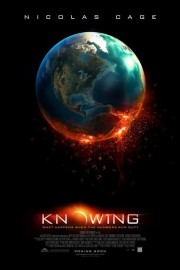Knowing
“Knowing” has been on my rader for a lot of years now. That said, when I discovered it was finally on its’ way this year, I was taken totally by surprise. The reason it’s been on my rader is the director behind it- Alex Proyas. Proyas is the Australian filmmaker behind two of my favorite films of all-time- “The Crow” and “Dark City.” Since his 1998 triumph “Dark City,” he’s delivered a little, enjoyably eccentric comedy in “Garage Days” and a big, effects-driven blockbuster in the Will Smith thriller “I, Robot.” Roger Ebert, when reviewing “Dark City” for his Great Movies series, praised Proyas for his generosity in filling every frame with more than we require.
No doubt many a geek will see a lot of that generosity in “Knowing,” which Proyas has been developing since around the time “I, Robot” came out. It’s a tribute to his perfectionism that the film’s long gestation process- at one point, a draft of the script had been written by “Donnie Darko’s” Richard Kelly- that “Knowing” has only been made stronger in the process. While I long to see a Proyas film more frequently than we have, if films like “Knowing” and “Dark City” are the results when he takes his time, I have no qualms waiting 4-5 years for my next fix.
As with many of his previous films- “Dark City” in particular- memories, the past, and the future holds the key to “Knowing’s” story, with Nicolas Cage’s character John Koestler drawn into a mystery of premonitions come true and seeming randomness in the world having a greater design when his son Caleb (Chandler Canterbury) opens one of several envelopes that was placed in a time capsule 50 years ago by the students of a Massachusetts elementary school. But whereas the rest had pictures drawn of what the students thought the future would be like, Caleb’s has a series of numbers sprawled along the entire paper. It’s unfortunate that the trailers give away the meaning of the numbers- like “Dark City,” this film likes to take left-hand turns that surprise and create a more enriching experience- but as Koestler sees the patterns in the numbers, what could’ve been a standard-issue thriller of numbers (like the dreadful “The Number 23”) becomes a profound, paranoid psychological drama in line with Darren Aronofsky’s “Pi.”
But Proyas has a much larger vision of what the film could be. The result is a film that could’ve been made at the height of the Cold War, when sci-fi standards like “The Day the Earth Stood Still” and the George Pal-produced “War of the Worlds” stood in for the threat of nuclear war. As it was with Spielberg’s “War of the Worlds” and- yes- even last year’s dreadful “Day the Earth Stood Still” remake, the new allegorical boogeymen are terrorism and our responsibility to the environment. “Knowing” hints at both ideas as Koestler and Caleb are drawn further down the story’s rabbit hole of questions regarding the universe’s randomness. But is the universe so random, or is there a larger pattern at work? And if we knew about that pattern, could we change it? “Knowing”- written with unflinching intelligence and purpose by Ryne Pearson, Juliet Snowden, Stiles White and Stuart Hazeldine- is a film that has respect for both ideas, even when one of them proves to be more correct than the other.
Like Zack Snyder’s adaptation of “Watchmen”- itself a philosophical and visual wonder- “Knowing” not only has depth in story but in production. Is there another filmmaker whose use of visual effects has been so adventurous so consistently? Proyas and cinematographer Simon Duggan (now on their third film together after “Garage Days” and “I, Robot”) give the film the type of loose freedom that is rarely played with when it comes to effects film (only “Cloverfield,” Spielberg’s “War of the Worlds,” and Whedon’s “Serenity” have gone here with similar success)- we’re more use to such “imperfection” in smaller-scale thrillers, but here Proyas is undaunted to use effects to show us amazing things where lesser filmmakers would play it safe, and keep the camera steady so we could see everything.
But “Knowing” is not a safe film, and Proyas fills every frame with a tension that’s palpable and unnerving- this is the type of thing M. Night Shyamalan tried to do with “The Beginning.” Proyas’ triumph- right down to Marco Beltrami’s gripping score- shows where Shyamalan went wrong. At the center of it all is Cage (who- like Will Smith in “I, Robot”- finds himself inspired under Proyas’ direction), whose character can’t fathom the truth behind what he discovers when he realizes that nothing’s random, and everything happens for a reason. If it takes you a while to fathom how good “Knowing” really is at its’ core, don’t fret- Proyas has been doing that his entire career.










